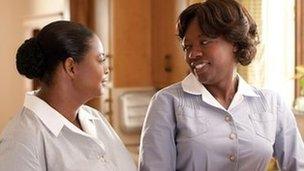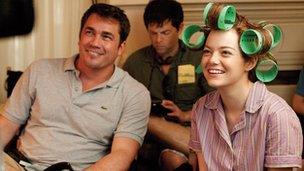Why did The Help clean up at the US box office?
- Published
Emma Stone, Viola Davis and Octavia Spencer tell BBC Breakfast about their new film, The Help
The Help, a heart-tugging drama about black housekeepers working in 1960s Mississippi, was the surprise hit at US cinemas this summer.
While other more fancied titles fell at the first, this modestly budgeted period piece - based on a best-selling novel by Kathryn Stockett - romped home to top the North American box office chart for three consecutive weeks.
Its takings in the US and Canada now stand in excess of $165m (£104.5m), prompting many in the industry to speculate on why it connected with audiences.
During a recent visit to London, its director and cast members offered their own theories on the film's unexpected success.
"It shows that everyone wants a story," says Tate Taylor, an actor turned director who, prior to The Help, had only one feature film to his credit.
"They want to go somewhere and be transported and not rely on robots and computer generation."
Actress Viola Davis believes this holds particularly true with regards to an older audience she feels has been marginalised of late.
"The over-35 audience who are not into 3D and effects, the people who are just into real, old-fashioned storytelling - they have been neglected," she says.
Yet Davis, who plays a domestic servant persuaded by a young journalist to spill the beans about her demanding white employers, insists this is only part of the picture.

Viola Davis (right) plays Aibileen, a long-serving maid in a Mississippi household
"The thing that really amazes me about this movie is the number of young men that have been moved by the story," she continues.
"I think it's because they see their mothers [in the characters]. They see what they have contributed and given to create a life for them."
"It ended up being the 'four quadrant' film no-one expected," says Taylor, employing a marketing term often used to describe a film that appeals to people of both sexes aged both over and under 25.
"Last year The King's Speech and True Grit grossed in the high 100s and no-one expected that either."
The latter film, directed by the Coen brothers, made $171m (£109m) in the US, slightly more than the $138m (£87.8m) The King's Speech accrued.
Overall, however, The King's Speech was the more profitable title, its worldwide takings exceeding $414m (£263m) compared to True Grit's $251m (£160m).
Receptive
The Help was released towards the end of the summer season, a time generally considered to be more receptive to films aimed primarily at women.
In previous years, the likes of Julie and Julia and Eat Pray Love - released in the US and Canada on 7 August 2009 and 13 August 2010 respectively - have performed well in this slot.
Yet the makers of The Help are less inclined to attribute its success to any larger socio-political changes in the US that may have occurred in the wake of President Barack Obama's election.

The Help is the second feature film to be directed by Tate Taylor
"I'd like to say that just to give you a little soundbite or whatever, but I really don't think there's any correlation," says Davis.
"I think people are always fascinated by race in America, only because it is as American as apple pie and hot dogs and baseball.
"It's our dirty little secret. The only time people talk about it is when it's [an element in] a big money-making movie."
"I don't necessarily think they didn't want to [talk about race]," says Taylor, a native of Jackson, Mississippi who has known Stockett since childhood. "They had just forgotten they could and should.
"It's easy to sweep things under the rug and act like they've changed or gone away."
"But we have to have these discussions," chips in actress Olivia Spencer, who plays another maid - the forthright, opinionated Minny - in The Help.
"It would be great if people my niece's age didn't have to associate with what African-Americans have endured, but everyone should know about it."
Awards contender?
The Help may have clicked with audiences across the Atlantic but it has left some critics non-plussed in the UK.
Film 2011 co-host Danny Leigh is among the naysayers, describing it as "at best syrupy and unconvincing, and at worst jaw-droppingly tasteless".
With a female-dominated cast that also includes Emma Stone, Sissy Spacek and fast-rising star Jessica Chastain, however, it is nonetheless being tipped as a potential awards contender.
Are the people responsible already dusting down their DJs and picking out gowns in readiness for the red carpet?
"I can't help but recognise what a triumph it is to have this many actresses in a movie this successful," says Taylor.
"But it seems ludicrous to speculate about the awards season. I don't want to give that kind of power to a fickle arena we're not in yet."
"It's not something we can control and we're very mindful of that," says Spencer, an actress hitherto best known in her native US for her broadly comedic roles.
"If it becomes celebrated by different awards bodies we will be excited, but it's not something we expect."
"I don't know how to answer questions about Oscars," concludes Davis. "We'll see what happens, right?
"But it's made $160m (£100m) in the States and the momentum is still going. That's bigger than awards, let me tell you."
The Help is out in the UK on 26 October. All figures from the Box Office Mojo, external website.
- Published22 August 2011